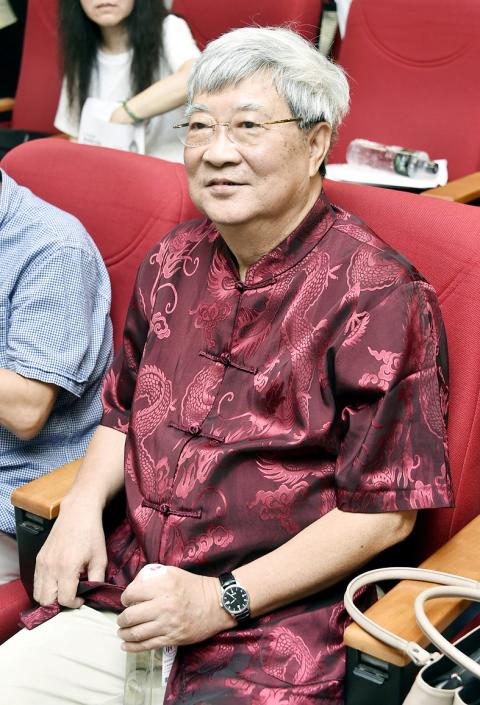Netizens yesterday accused the Chinese Nationalist Party (KMT) of using education as a propaganda tool for the promotion of its “one country, two areas” (一國兩區) formula, reacting to an article published by a news Web site in China featuring the convener of the Ministry of Education’s curricular adjustment committee, Wang Hsiao-po (王曉波).
Titled “Returning Taiwan’s History Textbooks to ‘One China’: Not Everyone is [former president] Lee Teng-hui (李登輝),” the article published by the Chinese media Web site Guancha.cn on April 29 has triggered heated discussion since it was reposted on the nation’s largest online academic bulletin board system, Professional Technology Temple (PTT), yesterday morning.
Shih Hsin University professor Wang was quoted in the article as saying that the reason adjustments were proposed to high-school curriculum guidelines three years after its implementation was because of misinformation in some history textbooks.

Photo: Chen Yi-chuan, Taipei Times
Some textbooks inaccurately described so-called “comfort women” as having volunteered to work in wartime brothels in Japan, he was quoted as saying.
“They also painted Taiwanese who were enlisted to serve in the Imperial Japanese Army during World War II as willingly joining the Japanese Army out of patriotism,” he said.
As former of the Chinese Unification Union vice chairman Wang has been a magnet for controversy.
His remarks often trigger an outpouring of fury from the online community, as did his recent accusation that Democratic Progressive Party chairperson Tsai Ing-wen (蔡英文) incited young students to stand up against curriculum changes.
The remark by Wang during a Taiwanese political talk show on Friday that “our country’s capital is Nanjing, but Taipei is the current capital of the Taiwan area” has also resulted in much criticism from netizens.
In the article published by Guancha.cn, Wang was quoted as saying that the biggest changes were made to the geography textbooks, which were drawn up based on the principle of “one country, two areas.”
The adjustments include a change from “China’s largest island is Hainan, while our country’s highest peak is Jade Mountain (玉山)” to “The largest island is Taiwan. Our nation’s highest peak is Mount Everest and its Taiwan area is surrounded by water,” Wang wrote.
Asked what kind of impact the curriculum adjustments had on the KMT’s campaign for next year’s presidential and legislative elections, Wang said they had created a strong cohesive force among pan-blue supporters.
“A lack of ‘national goals’ is a critical problem facing the KMT. The party requires more convincing rhetoric to persuade the public and that was exactly what we aimed to achieve through the curriculum changes,” Wang said in the article.
In an article published in the Chinese-language monthly magazine Straits Review (海峽評論) in September last year, titled “Textbooks on Japanese occupation and Taiwanese history” (日據與台灣史教科書), Wang wrote that the 2012 revisions of high-school curriculum guidelines were the result of compromises that were, in his opinion, “unsatisfactory, but acceptable.”
“After being incorporated with China-centric East Asian cultural history... the 2012 revisions allow Chinese history to take up more than two semesters of teaching hours,” Wang said.

SECURITY: As China is ‘reshaping’ Hong Kong’s population, Taiwan must raise the eligibility threshold for applications from Hong Kongers, Chiu Chui-cheng said When Hong Kong and Macau citizens apply for residency in Taiwan, it would be under a new category that includes a “national security observation period,” Mainland Affairs Council (MAC) Minister Chiu Chui-cheng (邱垂正) said yesterday. President William Lai (賴清德) on March 13 announced 17 strategies to counter China’s aggression toward Taiwan, including incorporating national security considerations into the review process for residency applications from Hong Kong and Macau citizens. The situation in Hong Kong is constantly changing, Chiu said to media yesterday on the sidelines of the Taipei Technology Run hosted by the Taipei Neihu Technology Park Development Association. With

CARROT AND STICK: While unrelenting in its military threats, China attracted nearly 40,000 Taiwanese to over 400 business events last year Nearly 40,000 Taiwanese last year joined industry events in China, such as conferences and trade fairs, supported by the Chinese government, a study showed yesterday, as Beijing ramps up a charm offensive toward Taipei alongside military pressure. China has long taken a carrot-and-stick approach to Taiwan, threatening it with the prospect of military action while reaching out to those it believes are amenable to Beijing’s point of view. Taiwanese security officials are wary of what they see as Beijing’s influence campaigns to sway public opinion after Taipei and Beijing gradually resumed travel links halted by the COVID-19 pandemic, but the scale of

A US Marine Corps regiment equipped with Naval Strike Missiles (NSM) is set to participate in the upcoming Balikatan 25 exercise in the Luzon Strait, marking the system’s first-ever deployment in the Philippines. US and Philippine officials have separately confirmed that the Navy Marine Expeditionary Ship Interdiction System (NMESIS) — the mobile launch platform for the Naval Strike Missile — would take part in the joint exercise. The missiles are being deployed to “a strategic first island chain chokepoint” in the waters between Taiwan proper and the Philippines, US-based Naval News reported. “The Luzon Strait and Bashi Channel represent a critical access

Pope Francis is be laid to rest on Saturday after lying in state for three days in St Peter’s Basilica, where the faithful are expected to flock to pay their respects to history’s first Latin American pontiff. The cardinals met yesterday in the Vatican’s synod hall to chart the next steps before a conclave begins to choose Francis’ successor, as condolences poured in from around the world. According to current norms, the conclave must begin between May 5 and 10. The cardinals set the funeral for Saturday at 10am in St Peter’s Square, to be celebrated by the dean of the College